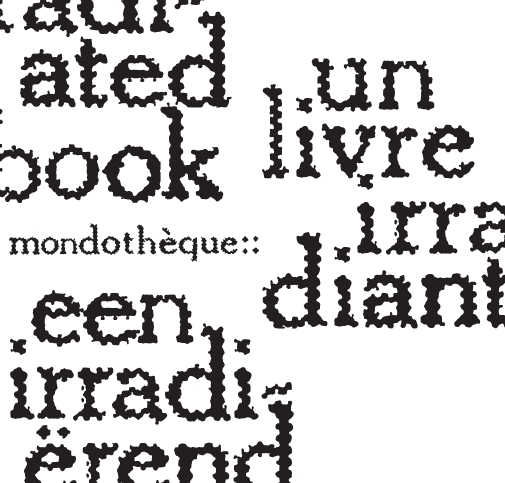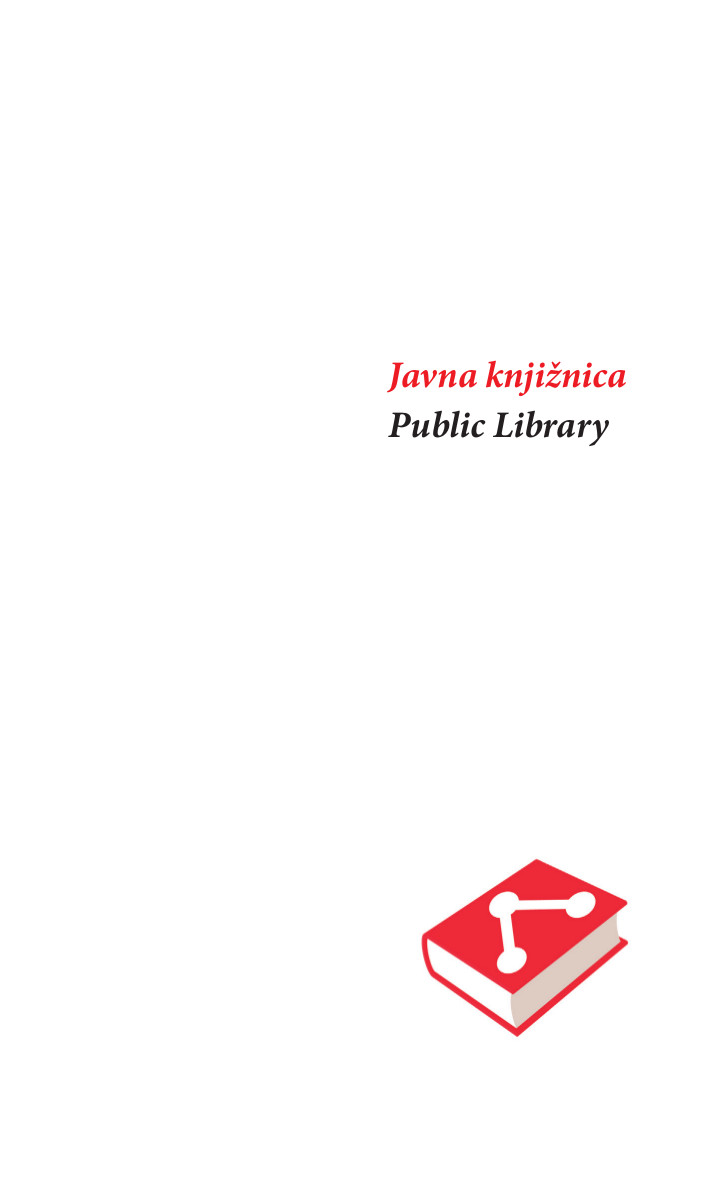Mondothèque: A Radiated Book / Un livre irradiant / Een irradiërend boek (2016) [EN, FR, NL]
Filed under book, wiki book | Tags: · architecture, archive, book, classification, data, document, google, internet, knowledge, library, web

“This Radiated Book started three years ago with an e-mail from the Mundaneum archive center in Mons, Belgium. It announced that Elio di Rupo, then prime minister of Belgium, was about to sign a collaboration agreement between the archive center and Google. The newsletter cited an article in the French newspaper Le Monde that coined the Mundaneum as ‘Google on paper’. It was our first encounter with many variations on the same theme.
The former mining area around Mons is also where Google has installed its largest datacenter in Europe, a result of negotiations by the same Di Rupo. Due to the re-branding of Paul Otlet as ‘founding father of the Internet’, Otlet’s oeuvre finally started to receive international attention. Local politicians wanting to transform the industrial heartland into a home for The Internet Age seized the moment and made the Mundaneum a central node in their campaigns. Google — grateful for discovering its posthumous francophone roots — sent chief evangelist Vint Cerf to the Mundaneum. Meanwhile, the archive center allowed the company to publish hundreds of documents on the website of Google Cultural Institute.
While the visual resemblance between a row of index drawers and a server park might not be a coincidence, it is something else to conflate the type of universalist knowledge project imagined by Paul Otlet and Henri Lafontaine with the enterprise of the search giant. The statement ‘Google on paper’ acted as a provocation, evoking other cases in other places where geographically situated histories are turned into advertising slogans, and cultural infrastructures pushed into the hands of global corporations.
An international band of artists, archivists and activists set out to unravel the many layers of this mesh. The direct comparison between the historical Mundaneum project and the mission of Alphabet Inc speaks of manipulative simplification on multiple levels, but to de-tangle its implications was easier said than done. Some of us were drawn in by misrepresentations of the oeuvre of Otlet himself, others felt the need to give an account of its Brussels’ roots, to re-insert the work of maintenance and caretaking into the his/story of founding fathers, or joined out of concern with the future of cultural institutions and libraries in digital times.” (from the Introduction)
Editorial team: André Castro, Sînziana Păltineanu, Dennis Pohl, Dick Reckard, Natacha Roussel, Femke Snelting, Alexia de Visscher
Publisher Constant, Brussels, Sep 2016
Free Art License 1.3
ISBN 9789081145954, 9081145959
225 pages
HTML (updated on 2019-5-31)
Git
PDF, PDF (43 MB)
Tomislav Medak, Marcell Mars, WHW (eds.): Public Library / Javna knjižnica (2015) [English/Croatian]
Filed under book | Tags: · book, internet, knowledge, library, metadata, web

A collection of four essays on the institution of the public library and the relevance of today’s online text collections. Published on the occasion of an exhibition and conference held in Zagreb, Croatia, in May and June 2015.
“The public library is:
* free access to books for every member of society;
* library catalog;
* librarian.
With books ready to be shared, meticulously cataloged, everyone is a librarian. When everyone is librarian, library is everywhere.”
Texts by McKenzie Wark, Tomislav Medak, Marcell Mars, Manar Zarroug, and Paul Otlet.
Edited by Tomislav Medak, Marcell Mars, and What, How & for Whom (WHW)
Publisher WHW & Multimedia Institute, Zagreb, May 2015
Creative Commons BY-SA 4.0 License
ISBN 9789535595137
144 pages
via Memory of the World
Wolfgang Ernst: Digital Memory and the Archive (2012)
Filed under book | Tags: · archive, art, communication, computing, culture, data, history, information, internet, knowledge, machine, media, media archeology, media studies, media theory, memory, photography, radio, sound, storage, technology, television, temporality, time

“In the popular imagination, archives are remote, largely obsolete institutions: either antiquated, inevitably dusty libraries or sinister repositories of personal secrets maintained by police states. Yet the archive is now a ubiquitous feature of digital life. Rather than being deleted, e-mails and other computer files are archived. Media software and cloud storage allow for the instantaneous cataloging and preservation of data, from music, photographs, and videos to personal information gathered by social media sites.
In this digital landscape, the archival-oriented media theories of Wolfgang Ernst are particularly relevant. Digital Memory and the Archive, the first English-language collection of the German media theorist’s work, brings together essays that present Ernst’s controversial materialist approach to media theory and history. His insights are central to the emerging field of media archaeology, which uncovers the role of specific technologies and mechanisms, rather than content, in shaping contemporary culture and society.
Ernst’s interrelated ideas on the archive, machine time and microtemporality, and the new regimes of memory offer a new perspective on both current digital culture and the infrastructure of media historical knowledge. For Ernst, different forms of media systems—from library catalogs to sound recordings—have influenced the content and understanding of the archive and other institutions of memory. At the same time, digital archiving has become a contested site that is highly resistant to curation, thus complicating the creation and preservation of cultural memory and history. ”
Edited and with an Introduction by Jussi Parikka
Publisher University of Minnesota Press, 2012
Volume 39 of Electronic Mediations
ISBN 0816677670, 9780816677672
265 pages
Reviews: Liam Cole Young (Reviews in Cultural Theory, 2013), Peter Ward (Information & Culture, 2014).
PDF (updated on 2025-12-9)
For more from Wolfgang Ernst see Monoskop wiki.
Comment (0)
